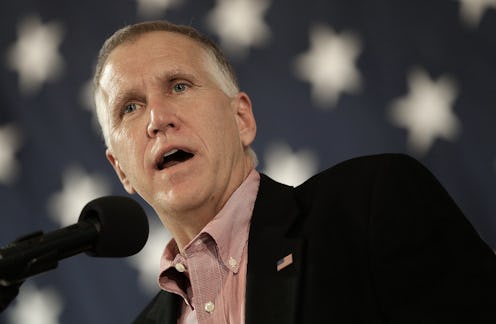News
Here's Where Democrats Won Last Night
For Democrats and progressives in North Carolina, Tuesday’s election of the controversial state House Speaker Thom Tillis to the U.S. Senate proved a crushing disappointment. But there were a couple of bright spots on the horizon for Southern progressives — three Democratic candidates for the North Carolina supreme court look to clinch their seats. While these victories won’t flip the Republican majority on the state’s highest court, it does rebalance the court’s voices to 4-3 split from 5-2.
Three progressive voices on the Court could make a tremendous difference going forward as the justices decide the constitutionality of the deluge of conservative policies that Tillis and his allies rammed through the NC General Assembly over the past two years.
The races for the NC Supreme Court are ostensibly nonpartisan, but the candidates’ personal party registrations and the endorsements from the state Democratic and Republican Parties made it clear where the party lines fell.
The Candidates That Won Seats
Democrat and incumbent Robin Hudson fought off Republican challenger and “Constitutional conservative” Eric Levinson, winning with 52 percent of the vote. Democrat Sam Ervin IV successfully took a seat from Republican Robert Hunter, two years after Erving lost a similar campaign for the high court in large part due to an influx of outside money. And Democratic Justice Cheri Beasley looked to be holding on to her seat with a scant lead of some 3,000 votes. But under state law, her opponent can request a recount, given that he is trailing by a margin of less than 10,000 votes (or 0.5 percent of the total votes cast).
Nonpartisan judicial elections tend to draw much less attention than do their partisan, sexier counterparts like the Senate and gubernatorial races. But in North Carolina, conservative groups and big donors were certainly paying attention this cycle. Candidates and outside groups threw a record-breaking $5.2 million into the races this cycle, a year after the Republican majority in the state legislature eliminated North Carolina’s popular public financing system for judicial candidates.
Although the money seemed to split fairly evenly among partisan lines, a last-minute donation from the Republican State Leadership Committee (funneled through a shadow organization, of course) poured an additional $400,000 into the contest right before Election Day. During the primary, Hudson was the target of negative campaign ads alleging she was soft on child molesters – ads bought by a conservative super PAC Justice for All and paid for in part by a $650,000 donation from the RSLC.
But as the candidates themselves worried, the influx of partisan money through backwater channels into nonpartisan races threatens the impartiality of the state’s judicial system as a whole. Bob Hall, the executive director of Democracy NC, might have said it best:
That’s the last part of our government that is hopefully shielded from complete partisan bickering, and the area where you want to see the facts and the laws and the Constitution trump partisan politics. It’s distorting the integrity of the judicial system. … You can buy a seat on the Supreme Court a lot cheaper than you can buy the governor’s mansion.
Why It Matters So Much
So. Why all the fuss about three seats on a state supreme court?
It all begins with the Republican takeover of the NC state legislature in 2010, the intensely gerrymandered redistricting process that shores up conservatives, and the installment of the Republican Gov. Pat McCrory in 2012. With such a tidal shift in the Southern state’s partisan topography, many national conservative organizations, including the Koch-funded Americans for Prosperity and the corporate-dominated American Legislative Exchange Council, saw an opportunity. They decided to use North Carolina as a testing ground for conservative policy proposals from school vouchers to tax reform to environmental de-regulation.
Progressives in turn challenged the new laws in the courts, and those lawsuits have been winding up to the NC supreme court. These justices will now have to make crucial decisions on a range of potentially explosive issues, including school voucher programs, tax policy, environmental regulation, legislative redistricting, constraints on abortion clinics and attempts to account for racial bias in the capital sentencing process.
If these extreme laws and policy programs stand in the North Carolina courts, that will swing the door wide open to conservative interest groups looking to transplant them to other states. This, ultimately, is why progressives and conservatives alike should care about who sits on North Carolina’s supreme court. (Say hello to unfair tax reforms that shift the burden onto the working classes, de-regulated fracking practices, school voucher programs that take money from public schools to send children to unaccountable private schools.)
Nationally, conservatives knew how important these contested supreme court seats were in North Carolina. And so they put their money where their mouths were.
Images: Getty Images (1)
